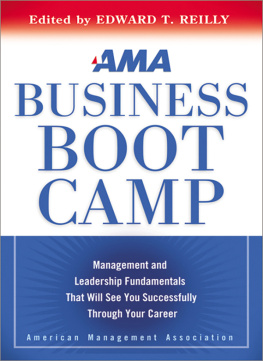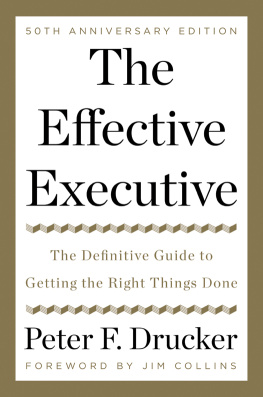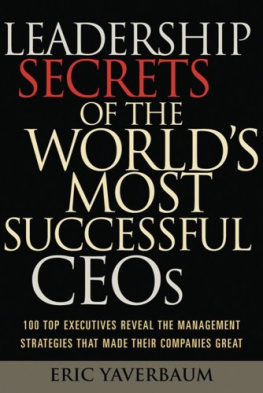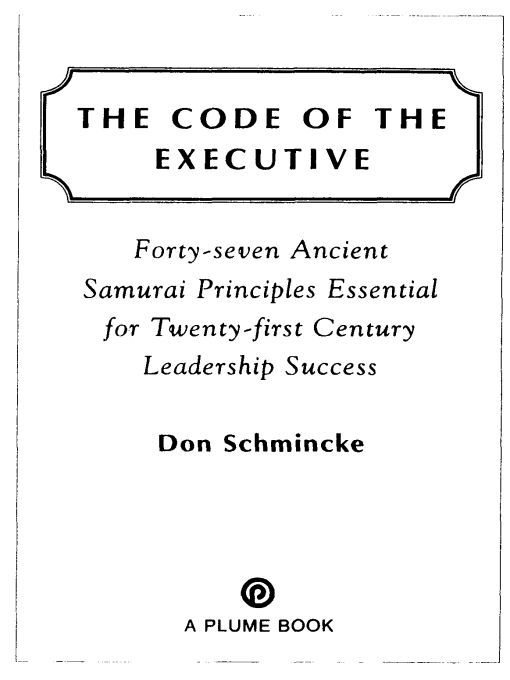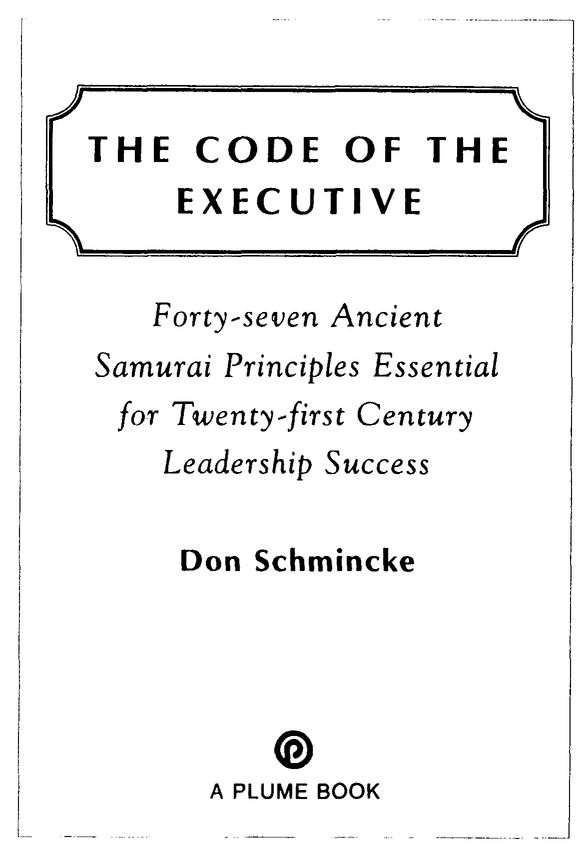Table of Contents
Exactly on target.
Dr. Evan Dobelle, president, Trinity College
An extremely timely challenge to managers to accept courageous leadership roles.
David Belden, GM, North America, Co-Ins
Finally, a companion to Sun-Tzus Art of War. The first time I read it I was mesmerized. The second time I was overwhelmed. This book is phenomenal.
Charles Davis, councilman, Gaithersburg, Maryland
The best gift for a boss on the market.
Mitch Diamond, president, Healthcare 2000
Will make a difference for a top executive ... one of a kind.
Calvin Cox, president, Asia Prepress
DON SCHMINCKES work in guiding executive leadership has been recognized by CNN, The Wall Street Journal, USA Today, and the American Management Association. His workshops have advanced thousands of executives towards extraordinary results by awakening exceptional leadership with timeless methods and ancient wisdom. A graduate of MIT and Johns Hopkins University, he is on the faculty of Johns Hopkins, where he now enjoys inflicting his unconventional techniques on innocent graduate students. He lives in Baltimore.
For more information on retreats, speeches, and other support materials contact:
1-888-CODE321 or www.executivecode.com
To my father, and other POWs, who lived by a Code we may never fully appreciate
ACKNOWLEDGMENTS
PRESERVATION of this centuries-old information took efforts I can only imagine. Those I am aware of, I would like to acknowledge. First, I am humbly grateful to The Japan Foundation, Tokyo, Japan. As holder of the copyright to The Code of the Samurai, they were the source of my work and were kind enough to allow me permission to use it as the basis for this book. Second, I thank the heir to Professor A. L. Sadlers rights, the president and scholars of St. Johns College, Oxford, England, for granting me permission to use his translation. Without this trail blazed, I may not have had the research to complete this journey.
This work would be far less had I not had the help of many individuals and organizations who have been instrumental in helping open my mind to new possibilities in philosophy and the nature of humankind. For their help, I would like to thank the late Howard Millman, Shep Jeffreys, Werner Erhard, Landmark Education, the Institute of Noetic Sciences (IONS), the Association for Research and Enlightenment (ARE), and the Foundation for Inner Peace. I especially wish to thank King Jigme Wangchuk for letting a few Westerners into his majestic and humble Himalayan country of Bhutan, and Inner Asia Expeditions for getting us there. It was there that the possibility of this book was born.
Updating this ancient work for the twenty-first century could only be done by being with CEOs who daily engage the struggle of leadership, profits, and organizational fulfillment while never complaining of the loneliness they share. In that respect, I would like to acknowledge The Executive Committee (TEC), an international CEO membership organization whose thousands of members helped me learn so much about the CEO experience. Special thanks to the CEOs in my TEC group in Baltimore, Maryland, who as of this edition are (in alphabetical order): Andy Buerger, Jewish Times Publishing; Alan Hamik, Notes and Queries; Bill Herdrich, Poly-Seal; Chip Lewis, PSA Financial; Jenny Morgan, VIPS; Jeannette Glose Partlow, Maryland Chemical; Jane Satterfield, CARE Rehab; John Schock, FMS; Jerry Waller, StaffMax; and Garland Williamson, Information Control Systems. In addition, I thank the literally thousands of CEOs and executives around the world who allowed me to share in their experiences over the past fifteen years.
Along the path that led to this work, I met numerous individuals with whom it was a privilege to work and learn from. First, I would like to thank Mike Hammer for a critical thirty seconds of coaching before I set out on my own, Richard Pascale for his books that helped me become more comfortable with a different view of business, and the author J. Howard Shelov for pushing me to get a book out. Second, the various outstanding colleagues who collaborated with me on various dimensions of the management journey and who, whether they know it or not, helped me translate some of the concepts in this book more effectively, including: Joe Ollinger, Kim Whittemore, Steve Carley, Tom Gildee, Gary Christie, the late David Richardson, Brian Grissler, Atulya Mafatlal, Sudhir Trivedi, Larry Lohman, Diana Poss, Deb Keller, David Smith, Dan Twomey, Debbie Blair, Calvin Cox, Phil Spencer, Brian Richardson, Cathy Trower, Ric Samuels, the late Chuck Buerger, Dick Alban, Virginia Meade, Susan Barrett, Edward Marshall, and the Baltimore/Washington, D.C., TEC chairs Richard Yocum, Bob Soady, Bill Oyler, Charlie Davis, and Les Smolin. Special thanks to Martha Peake and the American Management Association for taking the risk of publishing my first article many years ago.
Finally, I would like to acknowledge the individuals who contributed directly to the publication of this work. First, I thank Lori Lipsky of Dutton Plume for publishing this release and my agent, Bob Silverstein, for taking a risk and having patience with me as this idea slowly blossomed. Also to Paul Gavazzi, who helped proof the interim draft before I locked myself in a room in Japantown, San Francisco, to complete the final one. Special thanks to Mike Knepp, who, in addition to handling our personal and corporate finances, helped me type the original translation. Of course, none of this would have been possible without my wife, Mary Zimmerman, who, after operating Zimmerman Realty daily, supported my hectic schedule with food, love, and an open ear and still had time to give me a beautiful baby girl, Rowan Elizabeth.
FOREWORD
OVER a thousand years ago, a group of executives set out on a daring journey. They sought the wisdom of extraordinary leadership so that they could create great organizations. What they discovered shaped one of the most uniquely effective frameworks for management in history, and it sustained them for seven hundred years. Some claim it even set the context for their global role today. This book is based on their discovery.
As most of our latest management trends end up as empty theories, perhaps there is much to be learned from such an obscure, ancient text, which until 1941 had not revealed its secrets to the West. It is not the first time an ancient text has been found to offer valuable insights for modern management. The Art of War, written by the brilliant military strategist Sun Tzu, has caused a recent stir in management even though it has been used by armies and leaders of civilizations for over two thousand years. As an effective resource for developing corporate strategy, hundreds of books and articles have since been published on The Art of War. Unfortunately, research shows that many fail to apply these strategic insights and even the effectiveness of strategic planning itself has been called into question. The strategy expert Mintzberg writes, A number of biased researchers set out to prove that planning paid, and collectively they proved no such thing. After working with hundreds of CEOs around the world for the past fifteen years, I have found that strategies do not fail because they could not be developed, but because they could not be executed. There are many books on formulating strategy, but there are few on how to create an organization where strategy can be actualized. This is a book on actualization.




